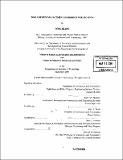| dc.contributor.advisor | Earll M. Murman. | en_US |
| dc.contributor.author | Zhang, Peng | en_US |
| dc.contributor.other | Massachusetts Institute of Technology. Dept. of Aeronautics and Astronautics. | en_US |
| dc.date.accessioned | 2006-03-24T18:13:53Z | |
| dc.date.available | 2006-03-24T18:13:53Z | |
| dc.date.copyright | 2003 | en_US |
| dc.date.issued | 2003 | en_US |
| dc.identifier.uri | http://hdl.handle.net/1721.1/30037 | |
| dc.description | Thesis (S.M.)--Massachusetts Institute of Technology, Engineering Systems Division, Technology and Policy Program; and, (S.M.)--Massachusetts Institute of Technology, Dept. of Aeronautics and Astronautics, 2003. | en_US |
| dc.description | Includes bibliographical references (leaves 74-75). | en_US |
| dc.description.abstract | Product development and innovation involve uncertainty, which inevitably incurs risk. Especially, as product development cycles shorten and resources condense, and as the products themselves grow more complex, managing risk in product developments is increasingly important. In the product development process, product verification plays an important role in risk management by verifying the performance of products under development and evaluating product-development risk. This thesis addresses the problem of risk management in automobile product verification. It looks at the product development and verification processes as an exercise in risk reduction. Risk in product verification is defined as the probability that performance estimates resulting from CAE simulations or physical tests will not satisfy requirement targets. Based on probabilistic methods and estimation theory, the thesis applies a mathematical model to assess the risk involved in product verification and provides a set of spreadsheet tools to emulate the evolution of performance estimates. The proposed model is employed to analyze practical cases using data from the Ford Motor Company. An optimization simulation suggests greater investment in early stages of product verification results in lower overall risk. | en_US |
| dc.description.statementofresponsibility | by Peng Zhang. | en_US |
| dc.format.extent | 75 leaves | en_US |
| dc.format.extent | 2469590 bytes | |
| dc.format.extent | 2469393 bytes | |
| dc.format.mimetype | application/pdf | |
| dc.format.mimetype | application/pdf | |
| dc.language.iso | eng | en_US |
| dc.publisher | Massachusetts Institute of Technology | en_US |
| dc.rights | M.I.T. theses are protected by copyright. They may be viewed from this source for any purpose, but reproduction or distribution in any format is prohibited without written permission. See provided URL for inquiries about permission. | en_US |
| dc.rights.uri | http://dspace.mit.edu/handle/1721.1/7582 | |
| dc.subject | Technology and Policy Program. | en_US |
| dc.subject | Aeronautics and Astronautics. | en_US |
| dc.title | Tools of risk management in product verification | en_US |
| dc.type | Thesis | en_US |
| dc.description.degree | S.M. | en_US |
| dc.contributor.department | Massachusetts Institute of Technology. Department of Aeronautics and Astronautics | |
| dc.contributor.department | Massachusetts Institute of Technology. Engineering Systems Division | |
| dc.contributor.department | Technology and Policy Program | |
| dc.identifier.oclc | 55089309 | en_US |
